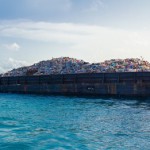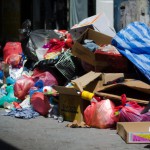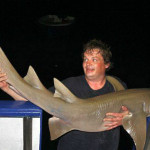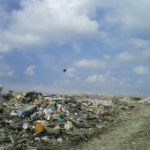He carefully loads the garbage into the boot of his car: it’s a mix of household waste.
“My mother composts all the food items in the backyard,” says Ahmed Ali, 30.
He drives to the dump site.
It is hard to miss; both sides of the road leading to it are lined with garbage, cans, plastic water bottles, paper waste, discarded household items, even a toilet seat. The entrance to the dump site is blocked by piles of garbage and overgrown bushes.
“I don’t want to dump garbage outside like this, but do I have a choice?” says a dejected Ali.
Sure enough, all three roads that lead to the dump site are lined with garbage on both sides.
A municipality worker comes by shortly with a rake, and carefully makes sure that no garbage spills onto the middle of the road.
Surveying the strewn garbage, it is easy to feel Ali’s dejection, after all this is Fuvahmulah; one of the most beautiful and fertile islands in the Maldives, and its unique ecosystem is being destroyed by waste.
Garbage dump or airport
“The 10,000 square feet dump site was built in 2003,” says Ahmed Mujthaba, councilor in charge of the Fuvamulah office. He adds that in 2006 the then government decided the same area of land was ideal to build an airport.
“It was decided that the dump site would have to be relocated and Mf600,000 was given as compensation by the government.”
It took one and half years for public consultation and to get an Environment Assessment Report (EIA) and approval from the housing ministry for the new location.
But no work has been carried out in the newly allocated dump site, located 200 meters from the existing dump.
Hassan Saeed, the atoll councilor, says a team from Environmental Research Center (now the Environment Protection Agency, or EPA) came to do a study in April 2008.
“They had a public consultation with the stakeholders and promised a ‘total waste management solution’ project that would take off in 2009.”
With no news from the EPA, Saeed contacted them in 2009 to be told that they didn’t have the necessary funds.
“We were told that the budget for it had been transferred to the newly created Waste Management Corporation (WMC) by the finance ministry.”
The WMC informed him that they hadn’t received any money for Fuvamulah.
Mohamed Zuhair, director general of EPA, says a study was done in Fuvamulah to try and develop energy from the waste but it was considered not feasible due to the small size of the population.
“We did have a budget under PSIP but that was taken from us and we can’t say for sure where it was transferred.”
Saeed says islanders who live in the vicinity of the proposed dump area also have concerns.
“They say how we can be sure people won’t dump garbage all over the place like they do now.”
They have agreed to the dump being built if the walls are 12 feet in height, the garbage is be segregated and if the latest equipment such as incinerators are brought in.
“Our funds are only enough to build a wall of three feet in height,” says Saeed.
He adds that a total waste solution is the answer and not just another dump site.
“There has to be household level sorting, ward collection points, a drive to re-use, re-cycle, and a way to export things that can’t be destroyed.”
The Women’s Development Committee is already sorting out garbage in their area, but it is proving to be futile as everything has to be dumped in the same area. Another NGO has proposed to provide bins in the famed beach areas in Fuvamulah, “but all that is useless, if all we are going to do is dump it at some site.”
Solutions
“It is not only Fuvamulah, almost all the islands of Maldives have a waste management problem,” says Ali Rilwan, executive director of NGO Blue Peace. He says it’s a serious issue and the lagoons of the Maldives are getting destroyed day by day.
“Does the environment ministry know what is happening in the islands? Do the councilors in the islands know that an EIA report has to be done for each project?” he asks.
He takes as an example the announcement by a councilor in Gaafu Dhaalu Atoll Thinadhoo that they are going to build a dump site in the sea.
Zuhair says the EPA is working towards a national waste management solution.
“We are not only developing waste management centres with the WMC and Province Utilities Companies, we are working to find solutions – we also want to do public awareness campaigns and have regional waste management sites.”
However no project is planned in Fuvamulah at the moment. Zuhair says most islands do contact them and know that they have to abide by their regulations.
“We found out about the Thinadhoo proposal through the TV and are contacting them to talk about it.”
Rilwan says a drive to reduce waste also has to be done “to reduce garbage, lessen PET bottles, plastic waste, all of these non bio-degradable items.”
He calls upon the government to do more, saying all he has seen so far is the creation of two corporations and the president and environment minister participating in a garbage collection day.
While the relevant authorities search for solutions, the garbage in Fuvamulah and other islands continue to pile up and pose safety, health and social issues to the islanders.





It is nothing else than ridiculous - the biggest garbage site in Maldives, Thilafushi, does not even have an incinerator, something that is obligatory for every tourist resort!
What is happening, where are the public garbage bins? Of course we need garbage bins, otherwise people will continue throwing everything right on spot, whether land or sea.
What are we doing to reduce waste? Why are we still producing and importing these horrible thin grocery bags? For every Supari packet you get a plastic bag, if you want!
In a country with 1% land area!
It is a shame to say "we can't install public garbage bins because people will throw organic waste into them" - it works in other countries as well!
Where are the fines imposed on offenders - if Singapore can do it, why not Maldives? It would be more than justified in the Maldives with almost no land space!
It is a shame - humans have created something that should last for centuries, and now we are using it for something that is consumed within minutes!
Creating dumping sites, proper waste management, awareness about re-use and waste separation, recycling facilities - all things that should have been established in the past 30 years! What has been done? Thilafushi, a toxic bomb has been created, threatening the public! http://www.bluepeacemaldives.org/blog/category/hazardous-waste
I have heard that a USA company wanted to clean up all of Maldives Garbage and give Maldives money for this . Maldives even signed a contract to do so but nothing happen so far ?